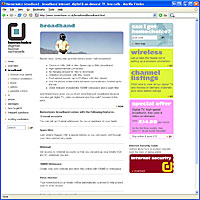 The wires are hot with rumours that BSkyB is contemplating a bout of wad waving in the direction of the video-on-demand, broadband and telephone company Homechoice, which is reportedly finding things tres tricky in the increasingly competitive TV broadband market.
The wires are hot with rumours that BSkyB is contemplating a bout of wad waving in the direction of the video-on-demand, broadband and telephone company Homechoice, which is reportedly finding things tres tricky in the increasingly competitive TV broadband market.
Homechoice’s parent company, Video Networks, managed to notch up hefty losses of £46.5m in 2004 – £1.5m worse than the year before – and faces an uncertain future of fearsome competition from the likes of Sky, the recently merged NTL/Telewest and BT.
Compared with Sky and NTL/Telewest’s subscription figures (7.8 m and 5.5m respectively), Homechoice’s last reported numbers of just 15,000 subscribers suggest that they could provide a tasty minnow for a major operator like Sky.
 Homechoice currently provides a broadband Internet and telephone service, with on-demand programmes covering comedy, drama, music soaps, pay-per-view movies and home shopping.
Homechoice currently provides a broadband Internet and telephone service, with on-demand programmes covering comedy, drama, music soaps, pay-per-view movies and home shopping.
Although Homechoice recently doubled the amount of homes that could receive their service to a more respectable 2.5m, there’s no guarantee that subscriber numbers will reach anywhere near that amount.
We got on the blower to Homechoice and were, not surprisingly, given the official line that, “There are no current plans to sell the business.”
 City analysts, however, suspect that Sky could snap up the company as part of its plans for video-on-demand and broadband.
City analysts, however, suspect that Sky could snap up the company as part of its plans for video-on-demand and broadband.
 Search company Blinkx have launched a free service that lets amateurs and pro filmmakers upload and store their video files to a searchable online library.
Search company Blinkx have launched a free service that lets amateurs and pro filmmakers upload and store their video files to a searchable online library. Users of the Blinkx.tv service will also be able to create custom channels, based on a specific search term.
Users of the Blinkx.tv service will also be able to create custom channels, based on a specific search term. This will be automatically populated in the background with videos that match a chosen search term, encouraging users to have the occasional rummage around in their smart folder to see what new videos have been added.
This will be automatically populated in the background with videos that match a chosen search term, encouraging users to have the occasional rummage around in their smart folder to see what new videos have been added.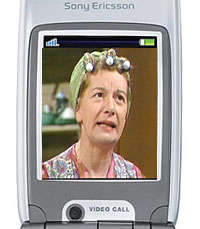 A report by Unstrung Insider claims that Mobile TV is set to become a breakthrough mass-market mobile data service, boosted by pioneering services offered by major global operators such as Orange, Vodafone, and SK Telecom.
A report by Unstrung Insider claims that Mobile TV is set to become a breakthrough mass-market mobile data service, boosted by pioneering services offered by major global operators such as Orange, Vodafone, and SK Telecom. The report comments on the industry expectation that “one-to-many” mass-market mobile TV services may be more efficiently delivered over dedicated mobile broadcast networks using technologies such as DVB-H (Digital Video Broadcast-Handheld), DMB (Digital Multimedia Broadcast), and MediaFLO.
The report comments on the industry expectation that “one-to-many” mass-market mobile TV services may be more efficiently delivered over dedicated mobile broadcast networks using technologies such as DVB-H (Digital Video Broadcast-Handheld), DMB (Digital Multimedia Broadcast), and MediaFLO. TV cables could provide broadband Internet access speeds up to a trouser-flapping 100 megabits per second as early as next year according to Finnish broadband equipment maker Teleste.
TV cables could provide broadband Internet access speeds up to a trouser-flapping 100 megabits per second as early as next year according to Finnish broadband equipment maker Teleste. “This is a cost-efficient technology, as we use the cable TV networks which are already in place,” Teleste’s CEO Jukka Rinnevaara told Reuters.
“This is a cost-efficient technology, as we use the cable TV networks which are already in place,” Teleste’s CEO Jukka Rinnevaara told Reuters. The foxy Finns are currently running field trials with cable TV service provider Essent in the Netherlands, but are yet to reach the top speeds they predicts will be available to most homes in a few years time.
The foxy Finns are currently running field trials with cable TV service provider Essent in the Netherlands, but are yet to reach the top speeds they predicts will be available to most homes in a few years time. Rissanen calculated the cost of connecting a home to the high speed ethernet-to-the-home technology could range from US$60.30 (~£35, ~€50) and US$241 (~£140, ~€200).
Rissanen calculated the cost of connecting a home to the high speed ethernet-to-the-home technology could range from US$60.30 (~£35, ~€50) and US$241 (~£140, ~€200).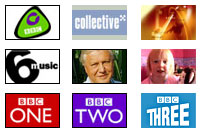 The BBC has announced a pilot scheme to premiere some new TV programmes before they are broadcast on over traditional channels.
The BBC has announced a pilot scheme to premiere some new TV programmes before they are broadcast on over traditional channels. Jana Bennett, The BBC’s Director of Television, said: “The broadband premiere of The Mighty Boosh is a significant step forward in offering our audiences even greater value in a changing television world.
Jana Bennett, The BBC’s Director of Television, said: “The broadband premiere of The Mighty Boosh is a significant step forward in offering our audiences even greater value in a changing television world. There’s something of a stampede starting up of companies ready and willing to experiment with video over broadband, with BT announcing that it planned to begin trials of
There’s something of a stampede starting up of companies ready and willing to experiment with video over broadband, with BT announcing that it planned to begin trials of  Abertis Telecom, Nokia and Telefonica Moviles Espana have emerged smiling from a big converging huddle with news of a mobile TV pilot using Digital Video Broadcasting-Handheld (DVB-H) technology.
Abertis Telecom, Nokia and Telefonica Moviles Espana have emerged smiling from a big converging huddle with news of a mobile TV pilot using Digital Video Broadcasting-Handheld (DVB-H) technology. These will be equipped with a “special accessory” to receive the mobile TV broadcasts.
These will be equipped with a “special accessory” to receive the mobile TV broadcasts. Outdoor and indoor signal and broadcast quality will also be tested to help fine tune the best technical parameters for the viability of DVB-H based services.
Outdoor and indoor signal and broadcast quality will also be tested to help fine tune the best technical parameters for the viability of DVB-H based services. AOL launches video search service
AOL launches video search service Podcast subscriptions have rocketed over the one million mark, with figures from Pew Internet and American Life suggesting that over 6 million Americans – nearly a third of the estimated 22 million owners of MP3 players – have listened to podcasts.
Podcast subscriptions have rocketed over the one million mark, with figures from Pew Internet and American Life suggesting that over 6 million Americans – nearly a third of the estimated 22 million owners of MP3 players – have listened to podcasts. Life on the Web going to get considerably faster for some denizens of London, thanks to an ultrafast 24Mb broadband connection offered by Be* Unlimited.
Life on the Web going to get considerably faster for some denizens of London, thanks to an ultrafast 24Mb broadband connection offered by Be* Unlimited. Cable company Telewest Broadband is making Teleport, its TV-on-demand service, available to over 26,000 customers in Cheltenham and Gloucester today.
Cable company Telewest Broadband is making Teleport, its TV-on-demand service, available to over 26,000 customers in Cheltenham and Gloucester today. Teleport Movies offers around 200 current and library films from FilmFlex, with rental charges costing between £2.00 (~$3.59, ~€3) and £3.50 (~$6.28, ~€5.20) for a 24-hour rental period.
Teleport Movies offers around 200 current and library films from FilmFlex, with rental charges costing between £2.00 (~$3.59, ~€3) and £3.50 (~$6.28, ~€5.20) for a 24-hour rental period.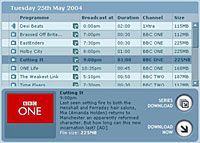 BBC New Media is to extend trials of its interactive Media Player (iMP), allowing viewers to download material from 500 hours of its television and radio programming.
BBC New Media is to extend trials of its interactive Media Player (iMP), allowing viewers to download material from 500 hours of its television and radio programming. The 5,000 trialists will be able to search for programmes they want to watch, filter programmes by channel, select subtitles and, in the case of some series, to collect and watch episodes that they may otherwise have missed.
The 5,000 trialists will be able to search for programmes they want to watch, filter programmes by channel, select subtitles and, in the case of some series, to collect and watch episodes that they may otherwise have missed.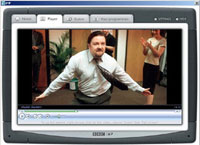 The pilot will use DRM software to delete programmes seven days after the programme has aired on TV, ensuring that users can no longer watch the content after that time. The digital rights system will also prevent users emailing the files to their chums or sharing it via disc.
The pilot will use DRM software to delete programmes seven days after the programme has aired on TV, ensuring that users can no longer watch the content after that time. The digital rights system will also prevent users emailing the files to their chums or sharing it via disc. Telewest Broadband today announced plans to transform its TV service, giving consumers greater access and control over additional digital programmes.
Telewest Broadband today announced plans to transform its TV service, giving consumers greater access and control over additional digital programmes.